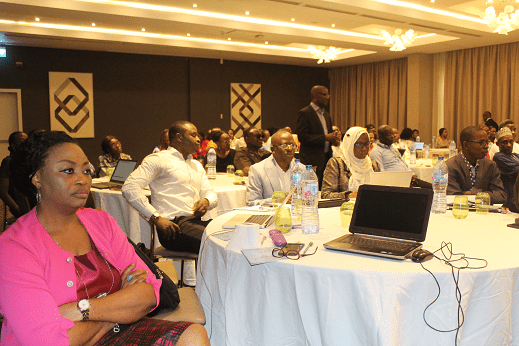-As NIMR Holds 2019 Annual Retreat
It was a conducive and friendly atmosphere at the second floor auditorium of the Radisson Blu Hotel, Ikeja GRA, as the Chief Medical Director (CMD) of the Lagos State University Teaching Hospital (LASUTH) Professor Tokunbo Fabanwo highlighted the health implications of working in a negative workplace to employees.
The LASUTH boss, who was the guest speaker at the 2019 Annual Retreat of the Nigerian Institute of Medical Research (NIMR) spoke on the topic: “Health & Workplace”, while listing the adverse effects of working in an unhealthy workplace to include : depression, chronic illnesses like hypertension, diabetes, cardiovascular diseases, and others.

He urged all organisations to embrace the policy of healthy workplace as enunciated by the World Health Organisation (WHO) as it is cheaper to create a conducive working environment for employees than treating them of illnesses developed through toxic working places.
His words : “The question about the workplace negative impacts on workforce is that if the work environment is not conducive, it leads to work stress, loss of productivity, absenteeism, people don’t want to come to work, they will always sign off sick, because they are not happy going to the environment where they work.
“So the emphasis now is to make our work environment as healthy as safe as conducive as possible, because we know that we spend about one-third of our lifetime in a work place, because if you work between 8am and 4pm, that is 8 hours in 24 hours, which amounts to one-third of your lifetime in your office.
“The implication of stress among workers is that it can lead to depression, chronic illnesses cropping in like hypertension, diabetes, cardiovascular disorder and others”, he asserted.
Professor of Obstetrics and gynaecology, also stressed the importance of having healthy canteens and cafeterias at workplaces as the type of meals served in these places go a long way in determining the health of the people.
He also mention the need for employees and employers to realise that there is life after work, which allows them create time for recreation, in order to boost productivity. “There must be life after work, and people must realise that. And if we don’t realise that, and we overwork our staff, we don’t care how they get home, and we know that some people don’t reach their homes until 12 midnight on a daily basis in Lagos. This will go a long way to affect their health conditions”.
The expert also explain why there should be zero tolerance for workplace harassment and discrimination among employees, adding that there should be reallocation of workload if need be, where this is causing an issue.
Fielding questions from pressmen, the Director General, Nigerian Institute of Medical Research (NIMR) stated reasons why ailing staff members should disclose their health conditions to medical professionals around them, to avoid unfortunate incidence of sudden death.
“The point being made is that people should not keep their ailments to themselves. This should be discussed with relevant professionals within the institute especially as a medical research institute, there will be doctors, nurses, and the likes. So when you have any issue about your health, the best thing to do is to discuss with a professional so that they can attend to it early.
“But when you decide to keep this to yourself, you are providing the disease the opportunity to grow, ravage your body and that can lead to death. The salient point is that if you have any health issue, please discuss with your medical team, and when you don’t have a medical team, please find the nearest hospital to visit”, he urged.
The NIMR DG also disclosed the intention of the institute to focus more on non-communicable diseases as they are now overtaking infectious diseases in terms of morbidity and mortality, especially in Africa, where Nigeria is a giant. “There is a need for the institute to develop research in the area of non-communicable diseases such as hypertension, diabetes, cardiovascular diseases, sickle cell anaemia, cancer, etc”.










